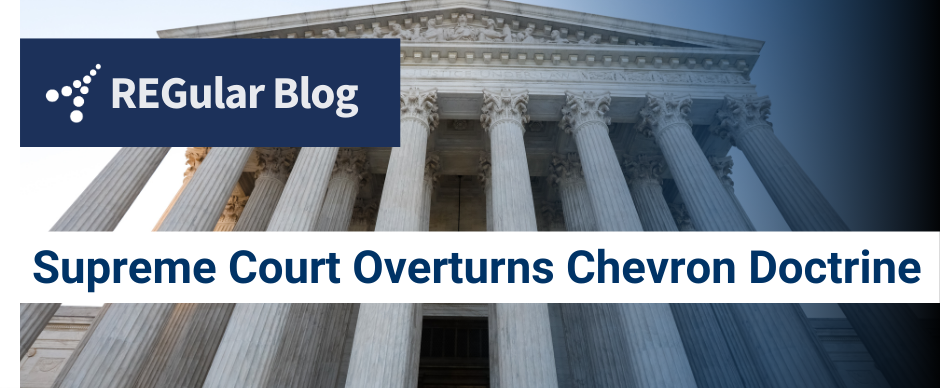Supreme Court Overturns Chevron Doctrine

In a landmark decision on Friday, the Supreme Court overturned the Chevron doctrine, a legal precedent that has long provided federal agencies with significant deference in interpreting ambiguous statutes. Established in the 1984 case of Chevron U.S.A., Inc. v. Natural Resources Defense Council, Inc., the doctrine established that if Congress has not directly addressed the question at the center of a dispute, a court was required to uphold the agency’s interpretation of the statute as long as it was reasonable. A court could not "substitute its own construction of a statutory provision for a reasonable interpretation made by the administrator of an agency."
In a 6-3 ruling, the Court found that Chevron deference is inconsistent with the Administrative Procedures Act, which governs how federal agencies handle regulations and directs courts to "decide legal questions by applying their own judgments." The Court ruled that because the APA "requires courts to exercise their independent judgment in deciding whether an agency has acted within its statutory authority, and courts may not defer to an agency interpretation of the law simply because a statute is ambiguous; Chevron is overruled.”
When the ruling was announced, many throughout the financial services industry began looking at what impact this might have, including how it will impact the NCUA and CFPB rulemaking process. Both agencies have issued statements that they are reviewing the decision and have no comments at this time.
Several industry groups believe this will lead to more legal challenges to NCUA and CFPB rulemakings. “The Supreme Court’s decision to overturn the Chevron doctrine that required courts to defer to administrative agencies’ interpretations of ambiguous acts of Congress has immense implications for highly regulated entities like credit unions," said America's Credit Unions' Chief Advocacy Officer, Carrie Hunt, in a statement. "While agencies, including the NCUA and CFPB, possess subject matter expertise, rulemakings and other agency actions must comply with the Administrative Procedure Act. This decision will have a momentous impact in the rule making process. While agencies’ rules may be easier to overturn, the rule making process itself will likely slow and be more cumbersome. We expect this decision will be both a help and hindrance to credit unions going forward.”
Many also predict that the ruling will lead to more explicit delegation of authority from Congress to agencies. Chevron deference applied when Congress implicitly, not explicitly, gave authority to regulatory agencies, so seeing more explicit grants of authority in bills is certainly a possibility.
Like many landmark rulings, the full effects of Friday's ruling will take years to unfold. However, one question is what will be the fate of past Court rulings that have relied on Chevron deference? In the majority opinion, Chief Justice Roberts indicated that the Court’s decision on Friday would not require such cases to overturned. “Mere reliance on Chevron cannot constitute a ‘special justification’ for overruling” a decision upholding agency action, “because to say a precedent relied on Chevron is, at best, just an argument that the precedent was wrongly decided” – which is not enough, standing along, to overrule the case. However, we could see proposed legislation to that effect. After the ruling, Rep. Mark Green (R-TN) announced he plans to introduce legislation to require the federal government to start sunsetting all agency rules upheld by Chevron unless Congress takes action to uphold them.
The Corner Post Ruling
This morning, the Court followed up with a related ruling in Corner Post, Inc. v. Board of Governors of the Federal Reserve System. In today's ruling, SCOTUS ruled that the APA's six year statute of limitations runs from when a plaintiff is first injured by final agency action.
The fact pattern in this case is interesting. After the passage of Dodd-Frank, the Fed promulgated Reg II, with the final rule effective in 2011. Retail trade groups sued months later, but ultimately were unsuccessful. In 2021, trade groups sued again under the Administrative Procedures Act (APA) this time adding in Corner Post, Inc. - a convenience store that opened in 2018.
The APA has a six-year statute of limitations, requiring claims to be "filed within six years after the right of action first accrues."
The District Court dismissed the suit, saying that the rule was issued in 2011, so the statute of limitations ran in 2017. The Eight Circuit affirmed. Today's ruling reverses, holding that an APA claim does not accrue until the plaintiff is injured. In this case, that means the six-year clock re-started when Corner Post first accepted a debit card swipe in 2018.
Applying this fact pattern and holding to credit union world: Say a new credit union is chartered in 2025. Could the credit union sue to challenge any NCUA rule they are injured by - even those finalized over six years prior? It seems likely after today's ruling.
We won't know the full impacts of Chevron and Corner Post for years to come, but it's fair to say both rulings have the potential to bring many more legal challenges to regulatory rulemakings both past and future.
We'll be monitoring developments and impacts on the NCUA, CFPB, and credit unions.
For more on this, here are a few additional sources:
CUToday has a great roundup of quotes and reactions from many industry stakeholders.
Amy Howe has an excellent legal analysis of the opinion.
« Return to "News" Go to main navigation
